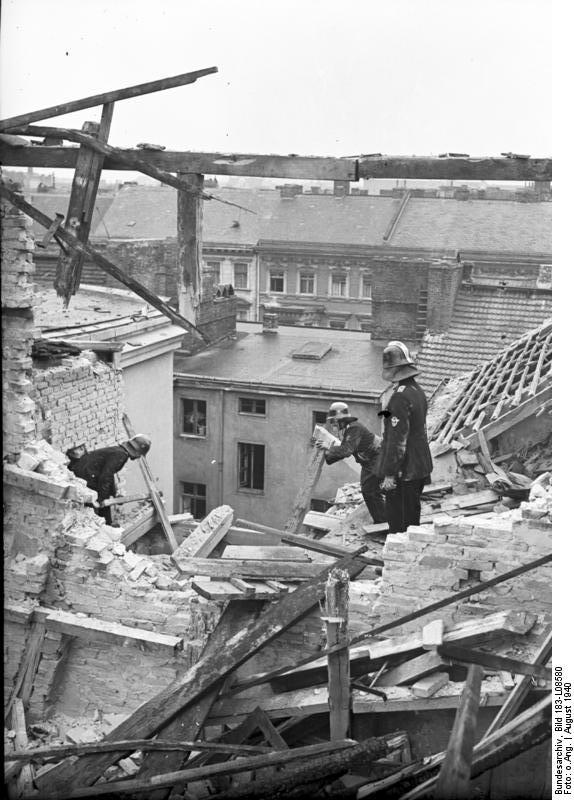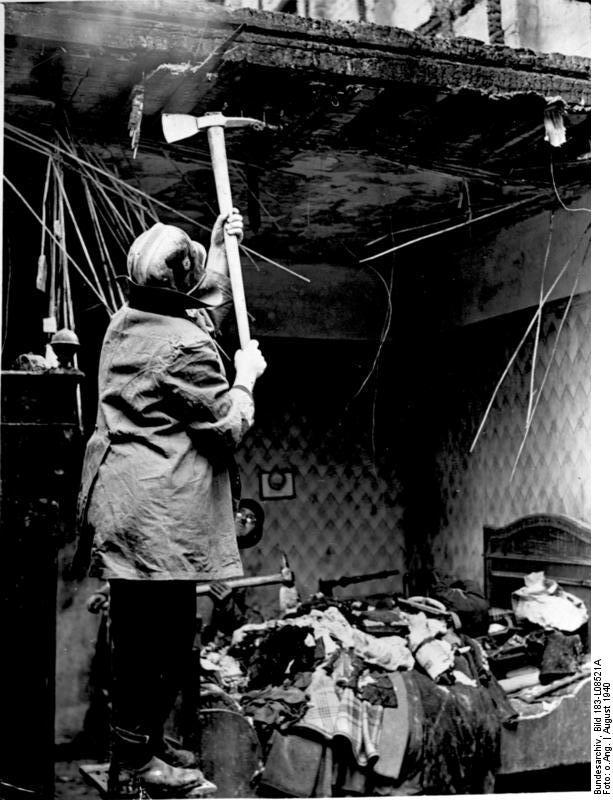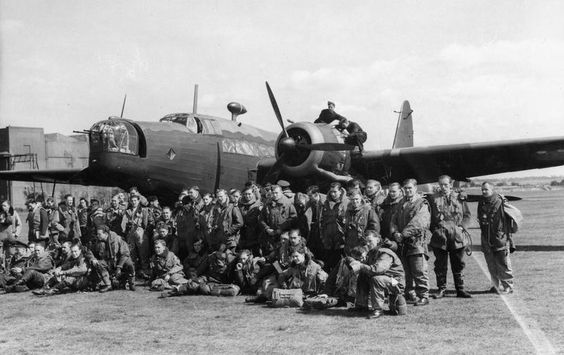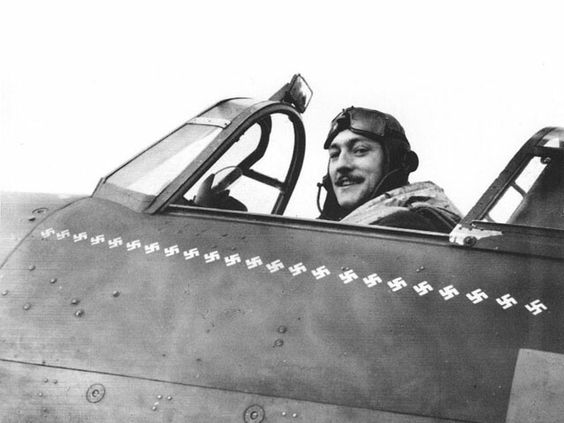Sunday 25 August 1940
 |
| Berlin bomb damage after the first RAF raid, August 1940 (Ang, Federal Archive). |
European Air Operations: The first tentative steps toward unrestricted aerial warfare on cities and other civilian populations that began with an accidental Luftwaffe raid on London on 22 August and leaped forward on 24 August with another takes a giant step forward on 25 August 1940. British Prime Minister Winston Churchill orders RAF Bomber Command to send a bomber force to Berlin, which turns into one of its larger raids of the war to date, on the night of the 25th. He does not say "bomb military and industrial targets."
So far in the war, Berlin has not been touched. There have been a handful of air raid alerts, but no actual attacks. The Bomber Command orders to the bomber squadrons are to target:
Everyone in 1940 knows how inaccurate bombers are - there is plenty of photo-reconnaissance being done after the fact to establish that - so attacking these targets in the heart of Berlin inevitably must cause many bombs to fall on civilian areas. Any appearance of targeting legitimate industrial plants is just a legal fig leaf - but then, the British could claim the same about the Luftwaffe raids that hit London "unintentionally." War is a dirty business, and one thing leads to another.
The slippery slope to all-out devastation just got much, much steeper. The Germans are furious because this seems like an intentional dastardly deed and war crime - they don't realize that the British feel the recent London bombings were intentional and that the British also were targeting factories and power stations. Luftwaffe boss Reichsmarschall Hermann Goering, in particular, suffers a blow to his image which he feels pressured to repair.
It is a tragic if unavoidable development in the history of the conflict that is not ameliorated by the fact that it all began with navigational errors over London - some due to British jamming of the known Luftwaffe navigational system. It also is due to the sheer lack of communication between the two sides.
It is pretty obvious to both sides at this point what is going on. Hitler has the next big decision to make. Every decision made now has huge, and often unexpected and self-detrimental, long-term consequences. Many accounts state that Hitler immediately authorizes unrestricted bombing after this raid, but that is not the case. Instead, he ponders what to do.
Elsewhere, RAF Coastal Command bombs Luftwaffe flying boat bases near Tromso, Norway, destroying a couple and damaging others and the base itself.
Battle of Britain: The day is somewhat cloudy, but with good flying conditions. Everybody is pondering what the recent attacks on London mean and how the Fighter Command strategy should react, and there is a feeling of indecision throughout the day. There definitely is a general belief that the Luftwaffe attacks on London were intentional, signaling a major change in strategy. However, they were not intentional, so RAF expectations of more attacks on it are premature.
The day is eerily quiet until 16:00 when the Luftwaffe sends over 100 aircraft north from Cherbourg and another 100 from the Channel Islands. The RAF quickly gets numerous squadrons in the air of Leigh-Mallory's No. 10 Group and Park's No. 11 Group. The opposing forces meet south of Weymouth and Portland, and a major air battle develops. Junkers Ju 88s of KG 51 and KG 54 attack Weymouth, Portland and Warmwell. Many of the bombers get through and bomb the airfield at Warmwell, the Scilly Islands, and the Bristol/Pembroke area. RAF Warmwell remains in service but is badly damaged.
In this action, Czech pilot Count Manfred M.B. Czernin has a huge day, downing three Bf 110s in quick succession. Both sides take heavy losses in this raid, the Luftwaffe around 20 aircraft and the RAF 15.
There also is a smaller action over Dover during the late afternoon, with some damage caused to the harbor. Another action by Dornier Do-17 bombers over Kent a couple of hours later at 16:00 results in some damage. Birmingham takes some bombs.
Total losses for the day are estimated as around 20 Luftwaffe planes and 16 RAF fighters. The Luftwaffe outnumbers the RAF fighter force by 2-1, so this is a favorable ratio for the Germans even without any adjustments. To be fair, the RAF loss figure should include the five RAF bombers lost over Europe during the night since the German bomber losses over England are always counted, but nobody does that because it is considered a separate battle. As usual, the London media is full of fantastic tales of many more Luftwaffe planes lost than is actually the case.
In terms of tactics, the close escort of the bombers which the fighter pilots hate actually is working well. The bombers are having more success getting through, and the fighter losses are not any higher than they were before. The massive differential in losses is being whittled away to the Luftwaffe's benefit.
The Luftwaffe transfers I,/JG 77 from Aalborg to Marquise, France. This brings it from Jutland to the Channel front at Pas-de-Calais and into the thick of the Battle of Britain.
Battle of the Atlantic: It is a particularly bad day during a bad week for the Atlantic convoys. Two of the most successful U-boats of the war, U-37 and U-48, and top U-boat commander Joachim Schepke of U-100 pad their totals, and other U-boats and the Luftwaffe also have major successes. U-48 and U-124 attack the same convoy but are operating independently. Allied convoys are devastated.
U-48 (K.Kapt. Hans-Rudolf Rösing), on her sixth patrol and operating out of Trondheim, stalks Convoy HX 65A out of Halifax north of the Butt of Lewis, Ireland, and torpedoes 6825-ton British tanker Athelcrest. The ship takes time to go under - tankers are notoriously difficult to sink - but eventually is scuttled by destroyer HMS Godetia, which takes off 6 survivors. There are 30 deaths.
U-48 also torpedoes and sinks 5763-ton British freighter Empire Merlin in the same area. There are 35 deaths and only one survivor. After its successes, U-48 is attacked with depth charges by corvette HMS Godetia but survives.
U-124 (Georg-Wilhelm Schulz) also is stalking convoy HX 65A around the Isle of Lewis and strikes just before midnight. He stands off the convoy and fires four torpedoes in quick succession at four different ships. Three of the torpedoes hit. Some accounts place these sinkings on the 26th because the attack happens so close to midnight, but the ships that sink go down almost immediately during the waning minutes of the 25th.
One of U-124's torpedoes hits 5394-ton British iron ore freighter Fircrest. The ship goes down quickly due to the heavy ore load (7900 tons). All 40 people on board perish.
Another of U-124's torpedoes hits 5169-ton British steel freighter Harpalyce. The ship, carrying 8000 tons of steel and iron, goes down within minutes. The Harpalyce crew has no time to use its 4-inch deck gun. There are five survivors and 41 deaths, including the convoy commodore Vice-Admiral B.G. Washington, CMG, DSO, RNR (Rtd).
The third of U-124's torpedoes strikes 3900-ton British freighter Stakesby. This ship's cargo (pit props) is lighter than the other two ships, so it stays afloat. The ship is blazing forward, though, and the crew abandons ship. A tug later salvages the badly burnt-out ship, but it sinks in shallow water at Glumaig Bay (later salvaged). Apparently, everyone survives.
Following its own attack, U-124 itself is attacked by destroyer HMS Godetia. It survives the attack but damages itself on an underwater rock formation when it dives deep (90m 300ft) and is reduced to issuing weather reports for the remainder of its patrol.
U-37 (Kptlt. Victor Oehrn), on her seventh patrol and operating out of Lorient, continues its successful patrol. It has been stalking Convoy SC 1 west of Ireland, and torpedoes and sinks 4141-ton British freighter Blairmore. The Blairmore has onboard seven survivors from Royal Navy destroyer HMS Penzance, which the U-37 sank the day before. All of the Penzance men survive, but 4 of the 34 crew of the Blairmore perish.
U-37 also torpedoes and sinks 3409-ton British freighter Yewcrest. There are 37 survivors, and one crewman perishes. The Yewcrest is a straggler from Convoy OB 201, and stragglers are particularly vulnerable to attack.
U-100 (Kptlt. Joachim Schepke) is on her first patrol in the Atlantic west of the Outer Hebrides. It torpedoes and sinks 5471-ton British freighter Jamaica Pioneer. There are two deaths and 68 survivors.
U-57 (Oblt.z.S. Erich Topp) is on her 11th and last patrol west of County Galway. As her final victory of the war, U-57 torpedoes and sinks 7468-ton British freighter Pecten. The ship goes down within 90 seconds and 48 crew perish, with 8 survivors. The Pecten is a straggler from Convoy 65A and is counted as another loss from that ill-fated convoy. U-57, incidentally, had survived a depth charge attack by destroyer HMS Westcott in the morning, then spent all day running after the convoy and finally catching it to make this kill.
The Luftwaffe has long-range Focke-Wulf Fw 200 Condors of Kampfgeschwader 40, 1 Staffeln, operating out of French bases. They find and sink British freighter Goathland southwest of Ireland. Everybody on board survives. British freighters Ossian and Hampshire Coast also are damaged southwest of Wales. British freighter Sanfry also suffers damage by the Luftwaffe in the Channel.
In its first action of the war, battleship Bismarck fires almost 500 shells against attacking RAF aircraft at Kiel without any hits.
British minelayers set down Minefield BS 34 in the North Sea.
German raider Thor obtains supplies from supply ship Rekum.
Convoys OA 204 and MT 150 depart from Methil, Convoy FN 262 departs from Southend, Convoy FS 262 departs from the Tyne, Convoy SC 2 departs from St. Johns, Convoy BN 4 departs from Bombay.
Battle of the Mediterranean: A typical plane transfer from Gibraltar to Malta goes awry when a Blenheim has some kind of mechanical issue and ditches near Pantelleria. It may have run out of fuel. Pilot Warrant Officer G.H. Cluley, the only one aboard, perishes.
Romanian/Hungarian Relations: Romania, seething about what it considers to be territorial opportunism by all of its neighbors, accuses Hungary of violating its airspace.
Baltic States: In a purely ceremonial move, the Supreme Soviet "permits" the three Baltic States to become Soviet Socialist Republics, as they have "voted" to do.
France: The claimant to the French throne, Jean III, Duc de Guise, passes away and is succeeded by son Henri, Comte de Paris.
China: The British fulfill their promise of earlier in the summer and evacuate the last of their forces from Shanghai and Tientsin Province under intense Japanese pressure (a blockade of Tientsin, for instance). They will never return as an occupying power.
August 1940
August 1, 1940: Two RN Subs Lost
August 2, 1940: Operation Hurry
August 3, 1940: Italians Attack British Somaliland
August 4, 1940: Dueling Legends in the US
August 5, 1940: First Plan for Barbarossa
August 6, 1940: Wipe Out The RAF
August 7, 1940: Burning Oil Plants
August 8, 1940: True Start of Battle of Britain
August 9, 1940: Aufbau Ost
August 10, 1940: Romania Clamps Down On Jews
August 11, 1940: Huge Aerial Losses
August 12, 1940: Attacks on Radar
August 13, 1940: Adler Tag
August 14, 1940: Sir Henry's Mission
August 15, 1940: Luftwaffe's Black Thursday
August 16, 1940: Wolfpack Time
August 17, 1940: Blockade of Britain
August 18, 1940: The Hardest Day
August 19, 1940: Enter The Zero
August 20, 1940: So Much Owed By So Many
August 21, 1940: Anglo Saxon Incident
August 22, 1940: Hellfire Corner
August 23, 1940: Seaplanes Attack
August 24, 1940: Slippery Slope
August 25, 1940: RAF Bombs Berlin
August 26, 1940: Troops Moved for Barbarossa
August 27, 1940: Air Base in Iceland
August 28, 1940: Call Me Meyer
August 29, 1940: Schepke's Big Day
August 30, 1940: RAF's Bad Day
August 31, 1940: Texel Disaster
2020
So far in the war, Berlin has not been touched. There have been a handful of air raid alerts, but no actual attacks. The Bomber Command orders to the bomber squadrons are to target:
- Siemenstadt plants producing 85% of the electrical power in the area;
- Berlin's Klingenberg power station;
- the Henschel Aircraft Factory in Berlin;
- the Bucker training aircraft factory at Rangsdorf;
- Tempelhof aerodrome; and
- the Tegel gasworks.
- 12 Handley Page Hampden bombers Nos. 61 and 144 Squadrons;
- 9 Vickers Wellingtons of No. 99 Squadron;
- 8 Vickers Wellingtons of No. 149 Squadron;
- 9 Armstrong Whitworth Whitley bombers of No. 51 Squadron
- 5 Whitley bombers of No. 78 Squadron.
Everyone in 1940 knows how inaccurate bombers are - there is plenty of photo-reconnaissance being done after the fact to establish that - so attacking these targets in the heart of Berlin inevitably must cause many bombs to fall on civilian areas. Any appearance of targeting legitimate industrial plants is just a legal fig leaf - but then, the British could claim the same about the Luftwaffe raids that hit London "unintentionally." War is a dirty business, and one thing leads to another.
The slippery slope to all-out devastation just got much, much steeper. The Germans are furious because this seems like an intentional dastardly deed and war crime - they don't realize that the British feel the recent London bombings were intentional and that the British also were targeting factories and power stations. Luftwaffe boss Reichsmarschall Hermann Goering, in particular, suffers a blow to his image which he feels pressured to repair.
It is a tragic if unavoidable development in the history of the conflict that is not ameliorated by the fact that it all began with navigational errors over London - some due to British jamming of the known Luftwaffe navigational system. It also is due to the sheer lack of communication between the two sides.
It is pretty obvious to both sides at this point what is going on. Hitler has the next big decision to make. Every decision made now has huge, and often unexpected and self-detrimental, long-term consequences. Many accounts state that Hitler immediately authorizes unrestricted bombing after this raid, but that is not the case. Instead, he ponders what to do.
Elsewhere, RAF Coastal Command bombs Luftwaffe flying boat bases near Tromso, Norway, destroying a couple and damaging others and the base itself.
 |
| Inspecting the damage in Berlin after the first RAF raid (Ang, Federal Archives). |
The day is eerily quiet until 16:00 when the Luftwaffe sends over 100 aircraft north from Cherbourg and another 100 from the Channel Islands. The RAF quickly gets numerous squadrons in the air of Leigh-Mallory's No. 10 Group and Park's No. 11 Group. The opposing forces meet south of Weymouth and Portland, and a major air battle develops. Junkers Ju 88s of KG 51 and KG 54 attack Weymouth, Portland and Warmwell. Many of the bombers get through and bomb the airfield at Warmwell, the Scilly Islands, and the Bristol/Pembroke area. RAF Warmwell remains in service but is badly damaged.
In this action, Czech pilot Count Manfred M.B. Czernin has a huge day, downing three Bf 110s in quick succession. Both sides take heavy losses in this raid, the Luftwaffe around 20 aircraft and the RAF 15.
 |
| Count Manfred M.B. Czernin. |
Total losses for the day are estimated as around 20 Luftwaffe planes and 16 RAF fighters. The Luftwaffe outnumbers the RAF fighter force by 2-1, so this is a favorable ratio for the Germans even without any adjustments. To be fair, the RAF loss figure should include the five RAF bombers lost over Europe during the night since the German bomber losses over England are always counted, but nobody does that because it is considered a separate battle. As usual, the London media is full of fantastic tales of many more Luftwaffe planes lost than is actually the case.
In terms of tactics, the close escort of the bombers which the fighter pilots hate actually is working well. The bombers are having more success getting through, and the fighter losses are not any higher than they were before. The massive differential in losses is being whittled away to the Luftwaffe's benefit.
The Luftwaffe transfers I,/JG 77 from Aalborg to Marquise, France. This brings it from Jutland to the Channel front at Pas-de-Calais and into the thick of the Battle of Britain.
 |
| Wellington bomber crews who made it back at a press event after the first raid on Berlin on August 25, 1940. |
U-48 (K.Kapt. Hans-Rudolf Rösing), on her sixth patrol and operating out of Trondheim, stalks Convoy HX 65A out of Halifax north of the Butt of Lewis, Ireland, and torpedoes 6825-ton British tanker Athelcrest. The ship takes time to go under - tankers are notoriously difficult to sink - but eventually is scuttled by destroyer HMS Godetia, which takes off 6 survivors. There are 30 deaths.
U-48 also torpedoes and sinks 5763-ton British freighter Empire Merlin in the same area. There are 35 deaths and only one survivor. After its successes, U-48 is attacked with depth charges by corvette HMS Godetia but survives.
U-124 (Georg-Wilhelm Schulz) also is stalking convoy HX 65A around the Isle of Lewis and strikes just before midnight. He stands off the convoy and fires four torpedoes in quick succession at four different ships. Three of the torpedoes hit. Some accounts place these sinkings on the 26th because the attack happens so close to midnight, but the ships that sink go down almost immediately during the waning minutes of the 25th.
One of U-124's torpedoes hits 5394-ton British iron ore freighter Fircrest. The ship goes down quickly due to the heavy ore load (7900 tons). All 40 people on board perish.
Another of U-124's torpedoes hits 5169-ton British steel freighter Harpalyce. The ship, carrying 8000 tons of steel and iron, goes down within minutes. The Harpalyce crew has no time to use its 4-inch deck gun. There are five survivors and 41 deaths, including the convoy commodore Vice-Admiral B.G. Washington, CMG, DSO, RNR (Rtd).
The third of U-124's torpedoes strikes 3900-ton British freighter Stakesby. This ship's cargo (pit props) is lighter than the other two ships, so it stays afloat. The ship is blazing forward, though, and the crew abandons ship. A tug later salvages the badly burnt-out ship, but it sinks in shallow water at Glumaig Bay (later salvaged). Apparently, everyone survives.
Following its own attack, U-124 itself is attacked by destroyer HMS Godetia. It survives the attack but damages itself on an underwater rock formation when it dives deep (90m 300ft) and is reduced to issuing weather reports for the remainder of its patrol.
 |
| U-124, known as the "Edelweiss Boat," returns to its French port with numerous victory pennants. Each pennant represents a ship (presumed) sunk together with its tonnage. |
U-37 also torpedoes and sinks 3409-ton British freighter Yewcrest. There are 37 survivors, and one crewman perishes. The Yewcrest is a straggler from Convoy OB 201, and stragglers are particularly vulnerable to attack.
U-100 (Kptlt. Joachim Schepke) is on her first patrol in the Atlantic west of the Outer Hebrides. It torpedoes and sinks 5471-ton British freighter Jamaica Pioneer. There are two deaths and 68 survivors.
U-57 (Oblt.z.S. Erich Topp) is on her 11th and last patrol west of County Galway. As her final victory of the war, U-57 torpedoes and sinks 7468-ton British freighter Pecten. The ship goes down within 90 seconds and 48 crew perish, with 8 survivors. The Pecten is a straggler from Convoy 65A and is counted as another loss from that ill-fated convoy. U-57, incidentally, had survived a depth charge attack by destroyer HMS Westcott in the morning, then spent all day running after the convoy and finally catching it to make this kill.
The Luftwaffe has long-range Focke-Wulf Fw 200 Condors of Kampfgeschwader 40, 1 Staffeln, operating out of French bases. They find and sink British freighter Goathland southwest of Ireland. Everybody on board survives. British freighters Ossian and Hampshire Coast also are damaged southwest of Wales. British freighter Sanfry also suffers damage by the Luftwaffe in the Channel.
In its first action of the war, battleship Bismarck fires almost 500 shells against attacking RAF aircraft at Kiel without any hits.
British minelayers set down Minefield BS 34 in the North Sea.
German raider Thor obtains supplies from supply ship Rekum.
Convoys OA 204 and MT 150 depart from Methil, Convoy FN 262 departs from Southend, Convoy FS 262 departs from the Tyne, Convoy SC 2 departs from St. Johns, Convoy BN 4 departs from Bombay.
 |
| The Wellington bomber crews photographed at a press event after the first raid on Berlin, which took place on the night of 25-26 August 1940. HU 104668. |
Romanian/Hungarian Relations: Romania, seething about what it considers to be territorial opportunism by all of its neighbors, accuses Hungary of violating its airspace.
Baltic States: In a purely ceremonial move, the Supreme Soviet "permits" the three Baltic States to become Soviet Socialist Republics, as they have "voted" to do.
France: The claimant to the French throne, Jean III, Duc de Guise, passes away and is succeeded by son Henri, Comte de Paris.
China: The British fulfill their promise of earlier in the summer and evacuate the last of their forces from Shanghai and Tientsin Province under intense Japanese pressure (a blockade of Tientsin, for instance). They will never return as an occupying power.
August 1940
August 1, 1940: Two RN Subs Lost
August 2, 1940: Operation Hurry
August 3, 1940: Italians Attack British Somaliland
August 4, 1940: Dueling Legends in the US
August 5, 1940: First Plan for Barbarossa
August 6, 1940: Wipe Out The RAF
August 7, 1940: Burning Oil Plants
August 8, 1940: True Start of Battle of Britain
August 9, 1940: Aufbau Ost
August 10, 1940: Romania Clamps Down On Jews
August 11, 1940: Huge Aerial Losses
August 12, 1940: Attacks on Radar
August 13, 1940: Adler Tag
August 14, 1940: Sir Henry's Mission
August 15, 1940: Luftwaffe's Black Thursday
August 16, 1940: Wolfpack Time
August 17, 1940: Blockade of Britain
August 18, 1940: The Hardest Day
August 19, 1940: Enter The Zero
August 20, 1940: So Much Owed By So Many
August 21, 1940: Anglo Saxon Incident
August 22, 1940: Hellfire Corner
August 23, 1940: Seaplanes Attack
August 24, 1940: Slippery Slope
August 25, 1940: RAF Bombs Berlin
August 26, 1940: Troops Moved for Barbarossa
August 27, 1940: Air Base in Iceland
August 28, 1940: Call Me Meyer
August 29, 1940: Schepke's Big Day
August 30, 1940: RAF's Bad Day
August 31, 1940: Texel Disaster
2020

No comments:
Post a Comment